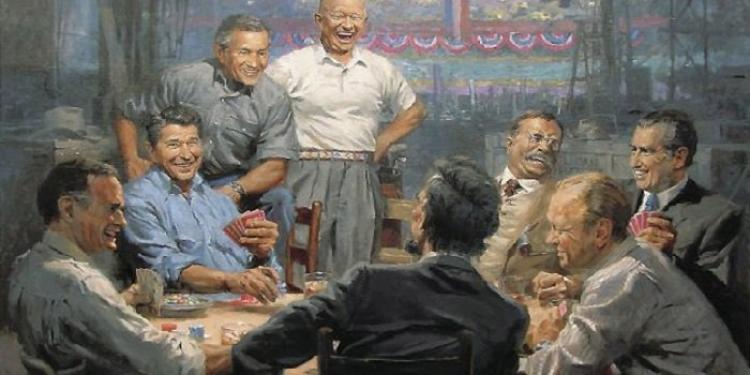A Brief Look at American Presidents who Liked to Play Poker (part 2)
Posted: July 9, 2015
Updated: October 6, 2017

Some U.S. presidents were well known for their love of the card game
It was said that Thomas Jefferson kept a close tally of his card playing success. President Andrew Jackson was said to have shot a man over a gambling debt. Dwight D. Eisenhower, learned poker and math behind it from old frontiersmen. Ulysses S. Grant led his Union Army to victory with his poker playing mentality. Richard Nixon used poker earnings to fund his first election. Warren Harding lost all the White House China in a poker game.
• Bush was an avid poker player who often defeated his classmates at Harvard
• Franklin Roosevelt held the greatest fascination for the “bluff”
• Lincoln often played poker while he worked as a riverboat pilot
Honorable mention should be paid to President George W. Bush. After the September 11th attacks and the second Iraq War, Bush was vilified and disrespected throughout the world. Among domestic issues, was Bushes’ signing of the Unlawful Internet Gambling Enforcement Act (UIGEA) which made US gambling news. The grand irony is that Bush was an avid poker player who routinely defeated his classmates at Harvard Business School. Perhaps Bush related poker to his old days when he claimed to have led a sinful life a drinking.
A couple of Roosevelts to add to the list

Franklin Delano Roosevelt was the only president to serve four consecutive terms staying in the White House for 12 years until he died of a stroke in 1945. His relief program called the “New Deal” bringing the golden age of big government intervention to help bring the country out of the Great Depression. His “New Deal Coalition” united labor unions, big city machines, white immigrants, African Americans and rural white southerners.
The creator of “social security” definitely paid his respects to the game of poker. In particular, Roosevelt held the greatest fascination for the “bluff” or the ability to convince other players that you have a greater hand than you actually do. Roosevelt was renowned for his ability to bluff people. He also exhibited a sound control of the game constantly having to tell people to “ante up or fold.” The War time president regularly played with his staff until his death.
Theodor Roosevelt, the fifth cousin of Franklin Roosevelt and his wife Eleanor’s uncle, was a “man of many trades.” The statesman, author, explorer, soldier, naturalist and hunter served as president during a time when the country was starting to change. His “Square Deal” offered average citizens fairness. He began construction of the Panama Canal and built more parks monuments and forests.
The Nobel Peace Prize winner lived by way of his signature “big stick diplomacy.”
Teddy definitely “walked lightly and carried a big stick” when it came to poker. The politician, who hadn’t any fear of stepping into the boxing ring, loved playing poker with his friends and political opponents in his free time. Considered a savy poker player, Teddy’s outgoing attitude and overt masculinity made him one of the more popular presidents in US History and gambling news history.
The poker playing general and honest Abe end the list

Abraham Lincoln grew up in Kentucky and Indiana when it was considered western frontier land. Mostly self-educated, Lincoln became a lawyer and served in the Illinois Congress. He also served as an US Congressmen for one term. His opposition to the Mexican-American War and the expansion of slavery made Lincoln not so popular. After finally being elected president, Lincoln had to form an army to fight the southern states that left the union over their right to practice slavery. Before the war ended Lincoln started the process of ending slavery.
As part of his political persona, Lincoln was associated with the “common working man.” This came from many of the jobs he took on in the past. As the pilot of a riverboat, Lincoln often witnessed the gamblers who took part in the “riverboat system.” Lincoln often played ante poker on his boat developing a “warm place” for the game. After he became president, Lincoln played the game less due to more pressing issues like the war.
Ulysses S. Grant was the 18th president who gained his prominence as Leader of the Union Army during the Civil War. Trained at West Point, Grant proved to be aggressive and had the command of a far more educated and skilled group of men. After he became president, Grant worked to support economic growth and protected African American citizenship. He also added African Americans to the U.S. congress as part of the reconstruction as well as prosecuted the Ku Klux Klan. Towards the end of his last term, there were suspicions of corruption in his cabinet.
Some say the Lincoln’s smartest decision was appointing a card player as head of his Union Army. Grant had an understanding of the cards and loved to play poker. This ability to take risks is what set him apart from Confederate Army Leader Robert E. Lee. In addition, Grant didn’t mind his soldiers gambling during their “down time.” His love for poker may have been why US gambling laws were enforced more on the state level than the federal level.












